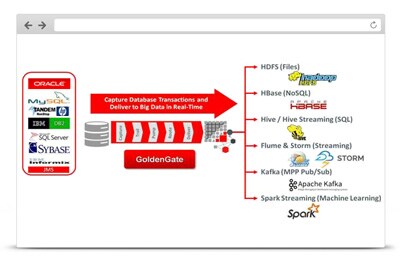Oracle Advances Vision for Enterprise Big Data
Oracle today unveiled new big data solutions that simplify information access and discovery, enabling customers to quickly turn data into business value. New offerings include Oracle Big Data Discovery, Oracle GoldenGate for Big Data, Oracle Big Data SQL 1.1 and Oracle NoSQL Database 3.2.5. These additions further Oracle's vision to enable Hadoop, NoSQL, and SQL technologies to work together and be deployed securely in any model—whether public cloud, private cloud or an on-premises infrastructure.
Generating value from big data requires the right tools to move and store data to effectively discover new insights. In order to operationalize those insights, new data must integrate securely with existing data, infrastructure, applications and processes. These Oracle solutions work seamlessly together to help companies exploit enterprise big data faster, at lower cost, and with less risk. They allow customers to securely reach across Hadoop, NoSQL and relational databases to easily and cost-effectively analyze massive and diverse data sets.
"One type of technology will no longer suffice in supporting all the analytics use cases. At the same time, data management and analysis as a series of unrelated projects results in an unmanageable IT quagmire and unnecessary risks," said Dan Vesset, vice president of Business Analytics Research, IDC. "IDC predicts that by 2017 unified data platform architecture will become the foundation of enterprise-wide big data and analytics strategy. The unification will occur across information management, analysis and search technology."
"Data is a new kind of capital and enterprises must invest their data capital strategically to create the best return," said Neil Mendelson, vice president of big data at Oracle. "Oracle gives customers an integrated platform that helps simplify access to all their data, discover new insights, predict outcomes in real time, and keep all their data governed and secure."
Oracle's new big data offerings are also designed to run seamlessly on the recently announced Oracle Big Data Appliance X5 and Oracle Exadata Database Machine X5. Together, these solutions deliver a complete, cost-effective platform to accessing, discovering, governing and securing big data.
Today's new big data innovations include:
- Oracle Big Data Discovery, the "visual face of Hadoop" and an end-to-end product for finding, exploring, transforming, discovering and sharing big data insights. Big data assets become more accessible to a greater number of business analysts across the organization and help reduce risks and improve time to value for big data projects.
- Oracle GoldenGate for Big Data, a Hadoop-based technology that allows customers to stream real-time unstructured data from heterogeneous transactional systems into big data systems, including targets such as Apache Hadoop, Apache Hive, Apache HBase and Apache Flume. It allows customers to enhance big data analytics initiatives by incorporating existing real-time architectures into big data solutions, while ensuring their big data reservoirs are up to date with production systems.
- Oracle Big Data SQL 1.1, a technology that extends Oracle SQL to Hadoop and NoSQL, with all the security of the Oracle Database. It enables a single fast query, written in Oracle SQL, to transparently access data in Hadoop, NoSQL and Oracle Database. Oracle Big Data SQL 1.1 provides tighter integration between Hadoop and Oracle Database, while increasing query performance by up to 40 percent from previous versions.
- Oracle NoSQL Database 3.2.5, an adaptable solution that allows developers to build high performance, next generation applications. The latest release provides predictable low latency, a RESTful API, and a Thrift-based C API, and is integrated with the Oracle Big Data platform. Building on Oracle Big Data SQL, Oracle NoSQL Database 3.2.5 also supports data definition language (DDL), making it even easier to use SQL to query NoSQL data.
Oracle Big Data Discovery Now Generally Available
Oracle Big Data Discovery leverages the power of Hadoop so that users can quickly and easily turn raw data into actionable business insight with a single product.
- Find and explore big data as easily as shopping online: Oracle Big Data Discovery provides a compelling visual interface for finding and exploring raw data in Hadoop. It acts as a scratch pad for uncovering statistical correlations between data attributes and combinations to evaluate whether a data set has potential and is worthy of further investigation and resources. Users browse an interactive visual data catalog through familiar guided navigation and powerful search capabilities.
- Transform and enrich data at scale: Raw data in Hadoop needs preparation before it's ready for analytics. Oracle Big Data Discovery reduces lengthy prep cycles and streamlines data wrangling through an intuitive and spreadsheet-like experience. Users can enhance data visually, without switching tools or writing code so that more time can be spent on analytics.
- Discover and share to find new value: Discovery and analysis require different tools than those used for data preparation. Oracle Big Data Discovery enables users to seamlessly move from preparation to analysis, and share insights with a click. Users can collaborate on results, publish original data sets back to Hadoop, and leverage results in other tools such as Pig, Hive, and Python.
- Unlock big data access for a wider group: Big data is usually in the hands of a few data scientists who are highly skilled, expensive and hard to find. Oracle Big Data Discovery makes big data simpler to manage and more accessible to a larger group, including analytics teams and business users. It also integrates with existing big data tools, making it easy for organizations to expand their big data teams to get the most from their human capital and data assets.





Комментарии